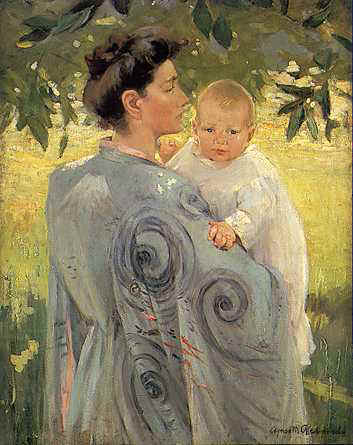|
Postpartum Feelings: Major Depression or
Just the Blues?

When her baby
is born, a woman anticipates joy and looks forward to
relief from the discomforts of the later months of
pregnancy. However, many women experience a period of
sadness, irritability and feelings of inadequacy. Why
should the birth of a new child be followed by tears?
The Baby Blues
In
America, about 50% to 80% of new mothers experience a
mild, self-limited period of depression, anxiety, and
emotional reactivity called the postpartum blues. This
usually occurs about three to five days after delivery.
Postpartum
Depression
, a more severe,
lasting depression is experienced by up to 12% of women
after delivery. Symptoms may include hopelessness,
guilt, difficulty concentrating, poor appetite, and
thoughts of suicide. Frequent trips to the baby’s
pediatrician may be a sign of depression.
Postpartum
Psychosis
is much rarer. It
is associated with about once in a thousand deliveries.
The new mother may have paranoia, hallucinations, rapid
speech, confusion and mood shifts. This condition is
often associated with Bipolar Disorder.
Risk Factors
Women
with a prior history of major depression or postpartum
problems may have more difficulty with postpartum
depression. Other factors associated with increased risk
are: difficult labor, a premature child, severe PMS, low
self-esteem, unwanted pregnancy, and lack of social
support.
Cultural
Factors
The incidence of
postpartum psychosis is fairly similar around the world.
However, there is much less postpartum blues or
depression in more traditional cultures. In these
cultures, there may be special rituals that help
transition the woman into her new role as a mother.
Extended family gather to provide support and
instruction. In our more mobile culture, the extended
family is less available to provide extended support.
The new mother may be expected to get her parenting
instructions from books or simply to “know” it. Our more
flexible view of the role of a mother can be liberating
but can also be overwhelming.
Getting Support
A
supportive spouse who can take time off work, or the
presence of older family members can ease the transition
to motherhood. Some new mothers hire a “baby nurse” or a
housekeeper to help out for several weeks.
Getting
Psychiatric Help
Most women with
postpartum depression are not diagnosed or treated. This
may lead to long-term depression and difficulty bonding
with the baby. One study showed that young children of
depressed mothers are more likely to have problem
behaviors and to score lower on standardized tests.
Fortunately we now have effective treatments for
postpartum depression. Counseling and support groups are
helpful. For some women, antidepressant medication can
make a big difference. Often a woman can, after
consulting with her doctor, continue breastfeeding while
taking these medications. With successful treatment, the
new mother is more fully able to enjoy her baby.
Return to our
page on
Women’s Mental Health
|